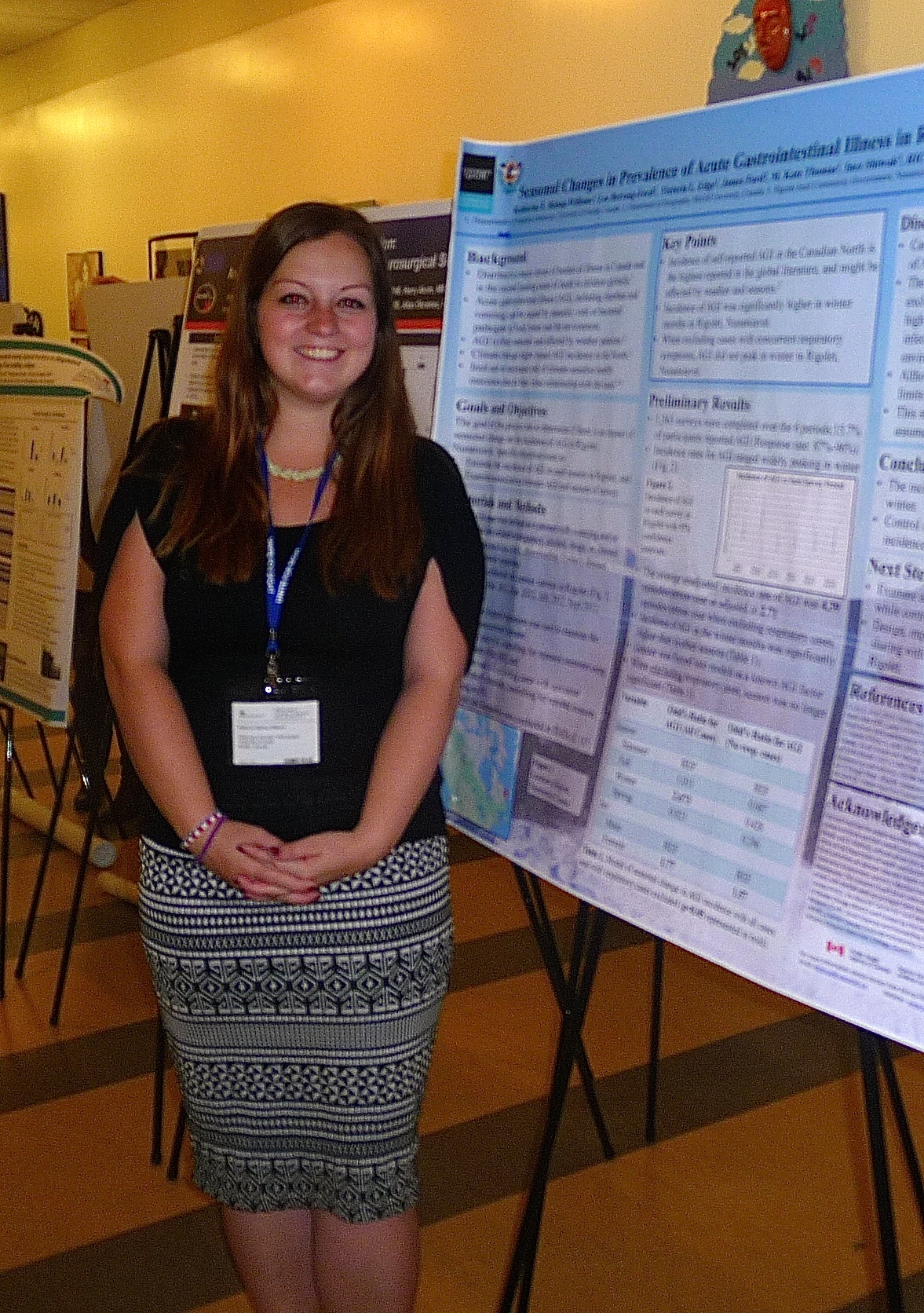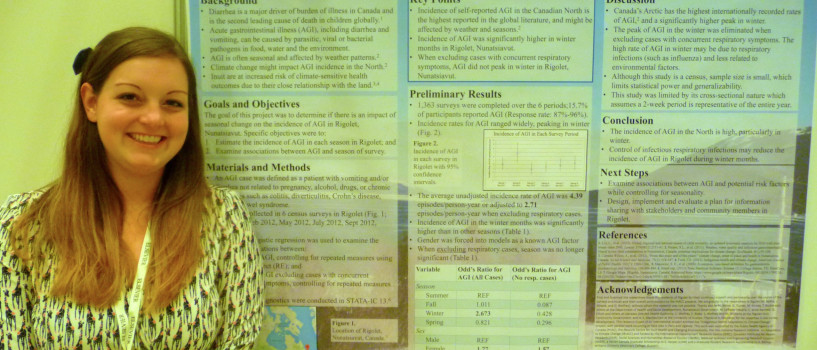Sylvia Kokunda, a Batwa surveyor and research assistant to the IHACC project, was invited to speak about the Batwa plight to the United Nations Permanent Forum on Indigenous Issues in New York City. Sylvia was the first Batwa woman from the Bwindi region to attend secondary school and earn a university degree. She now works with the Batwa Development Program as agriculture manager for the Batwa. To find out more about Sylvia's experience, click here to read her featured story in the Kellermann Foundation's news letter.
Anna Bunce presented at the Canadian Anthropological Society (CASCA) annual meeting at University Laval
Anna Bunce presented her work at the Canadian Anthropological Society (CASCA) annual meeting at University Laval in Quebec City last Wednesday. Her talk, titled "Inuit Women’s Berry Picking: Lessons on Gender, Procurement, Well-Being and the Environment/La cueillette de petits fruits chez les femmes inuites: leçons sur le genre, l’approvisionnement, le bien-être et l’environnement" explored the relationships Inuit women have with berry picking across Canada's north based on the findings of her own research along with that of Drs. Martha Dowsley (Lakehead University), and Scott Heyes (University of Canberra). Why has berry picking persisted among Inuit women? What role does berry picking play in the lives and identities of Inuit women? These questions were explored in the Re-Conception of Landscapes Session on May 13th.
Kate Bishop-Williams at the Yale University Global Health Conference on March 28th
On Saturday March 28th, Kate Bishop-Williams presented her research entitled Seasonal changes in prevalence of acute gastrointestinal illness and concurrent respiratory symptoms in Rigolet, Nunatsiavut, Canada at the Yale University Global Health Innovations Conference in New Haven, Connecticut. Kate’s abstract was selected as one of only 65 student posters from hundreds of submissions from across the United States and around the world.

Kate also had the opportunity to meet with former IHACC student researcher Joe Lewnard while at Yale University, and discuss experiences from past and present in Uganda.
Kate Bishop-Williams Presents at the IECID in Spain
Kate Bishop-Williams presented her preliminary research findings from Rigolet, Nunatsiavut at the first ever International Conference on the Impact of Environmental Change on Infectious Diseases in Sitges, Spain on Monday, March 22, 2015. Kate’s research is entitled: Seasonal changes in prevalence of acute gastrointestinal illness and concurrent respiratory symptoms in Rigolet, Nunatsiavut, Canada. This research was supervised by: Dr. Sherilee Harper, Dr. Lea Berrang-Ford, and Dr. Victoria Edge, and conducted in collaboration with Dr. Kate Thomas, Dr. James Ford, Inez Shiwak and the IHACC research team. Kate’s trip was funded by a Latornell scholarship at the University of Guelph.

Sierra Clark presented her work on AGI among the Batwa in southwestern Uganda at the Geography Honours poster session at McGill
 Sierra is presenting her honours thesis work looking at the burden, determinants and experience of self-reported acute gastrointestinal illness (AGI) among an indigenous Batwa-Pygmy population in southwestern Uganda at the Geography Honours poster session today at McGill University. We take this opportunity to congratulate Sierra on her thesis work. If you are interested in learning more about Sierra's work, please read her latest article, published in Epidemiology and Infection in December 2014:
Sierra is presenting her honours thesis work looking at the burden, determinants and experience of self-reported acute gastrointestinal illness (AGI) among an indigenous Batwa-Pygmy population in southwestern Uganda at the Geography Honours poster session today at McGill University. We take this opportunity to congratulate Sierra on her thesis work. If you are interested in learning more about Sierra's work, please read her latest article, published in Epidemiology and Infection in December 2014:
Clark, S., Berrang-Ford, L., Lwasa, S., Namanya, D.B., Edge, V.L., IHACC Research Team, and Harper, S. (2014).The burden and determinants of self-reported acute gastrointestinal illness in an Indigenous Batwa Pygmy population in southwestern Uganda. Epidemiology and Infection, [Epub ahead of print].
Abstract
Acute gastrointestinal illness (AGI) is an important public health priority worldwide. Few studies have captured the burden of AGI in developing countries, and even fewer have focused on Indigenous populations. This study aimed to estimate the incidence and determinants of AGI within a Batwa Pygmy Indigenous population in southwestern Uganda. A retrospective cross-sectional survey was conducted in January 2013 via a census of 10 Batwa communities (n = 583 participants). The AGI case definition included any self-reported symptoms of diarrhoea or vomiting in the past 2 weeks. The 14-day prevalence of AGI was 6·17% [95% confidence interval (CI) 4·2-8·1], corresponding to an annual incidence rate of 1·66 (95% CI 1·1-2·2) episodes of AGI per person-year. AGI prevalence was greatest in children aged <3 years (11·3%). A multivariable mixed-effects logistic regression model controlling for clustering at the community level indicated that exposure to goats [odds ratio (OR) 2·6, 95% CI 1·0-6·8], being a child aged <3 years (OR 4·8, 95% CI 1·2-18·9), and being a child, adolescent or senior Batwa in the higher median of wealth (OR 7·0, 95% CI 3·9-9·2) were significantly associated with having AGI. This research represents the first Indigenous community-census level study of AGI in Uganda, and highlights the substantial burden of AGI within this population.






